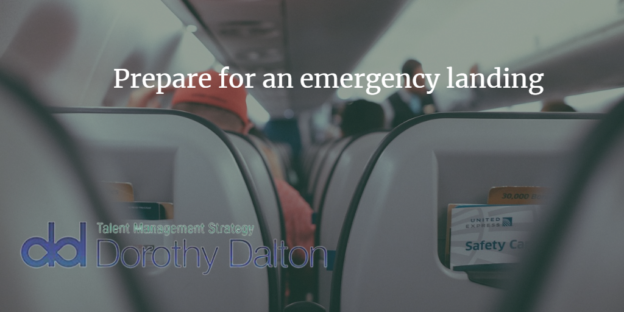Many of us sit on aeroplanes, especially frequent flier business trips and watch the cabin crew go through the emergency procedures with tuned-out indifference. We know the drill because we’ve seen it possibly hundreds of times in our lifetimes. Despite the commentary that all should pay attention, we dutifully turn off our electronic devices as instructed, read our books and magazines, chat to our colleagues and fellow passengers or simply settle in for a good movie, a nap and perhaps an inferior meal. After all the odds that anything will happen to us are slim. Right?
Workplace parallels
Sadly, despite the pace of unwelcome change which has become a hallmark of our economies, this is not too dissimilar to the view many take of the workplace. We have all seen many excellent people blindsided and ill-equipped to make an emergency landing which causes us to flail around in search of life-vests and oxygen masks. This can be because of redundancy, a merger, a take- over or any other unforeseen business circumstance. As the cold winds of recession blow through our economies, the reality is that having a professional emergency landing procedure in place is now taking on increased significance.
This is the professional equivalent of knowing the exact location of the emergency exits.
Need support during a difficult transition? Check out the individual coaching programmes.
So how can we do this? Here are 7 strategic career contingency measures:
- Up to date professional skills – it’s important to be current in this area. Many people take their feet off the pedal in terms of professional development , quite often in mid-career and find themselves lacking particularly in relation to newer (read cheaper) employees. It’s important not to become complacent and to view education as an ongoing exercise.
- Work on your network – many job seekers tap into their networks only when they have a need, by which time it’s too late. Networking should be an ongoing effort.
- Pay it forward – the more you can do for other people when you are in a position to do so makes it easier to ask for reciprocation at a critical time.
- Create a financial reserve – it’s hard to define in precise terms how long it could take to find another job. You could be lucky – but generally executive searches take about 3-6 months. Today the suggestion is that it can be as much as 9 months. So although it is hard in today’s economic climate, sound advice would be for all of us to have a reserve “disaster fund“ of a minimum of 6 months to cover critical expenses. One of the most terrifying aspects of job loss is the gnawing anxiety of how to meet fixed overheads. It’s a good idea to make sure that key financial contact details are in your address book. How well do you know your bank manager?
- Invest in professional support – many individuals seek career support when they are desperate: it might be when they have already lost their jobs or are facing any other sort of career blip. It is important to treat a career with the same strategic analysis as one might any other housekeeping exercise. In the words of John F. Kennedy “ The time to repair the roof is when the sun is shining”.
- Look after you – Job seekers with family or other obligations worry about letting down their families and their ability to support their nearest and dearest. But just as a cabin attendant will exhort passengers to put on their own life jackets and oxygen masks first and then look after their dependents, the same is true for the person looking for a job. Putting your own needs first will ultimately be in the best interests of the people who rely on you.
- Leave your luggage behind – this is always one I imagine I might struggle with if tested, but the logic resonates nevertheless. Sometimes our baggage gets in the way and we have to let it go and take that step into the unknown to protect ourselves.
So are you ready for a professional emergency landing?
If not – get in touch NOW!






Brilliant advice Dorothy – as one of my old bosses used to say rather cynically “be careful who you offend on the way up because you may pass them on you way down”.
I think having an emergency landing kit is great reinforcing our confidence to take the risks necessary to advance our careers as well as coping with a crash landing.
This is great advice – something that we should also be telling accompanying partners on expat assignments. We voluntarily leave our careers, often thinking it is just for the short term, but transfers are frequently extended, employment rules and certifications differ in out host locations and very quickly our ability to find work again is impacted.
Pingback: How to manage your career in times of uncertainty - 3Plus International
Pingback: 7 subtle hints your job is at risk - 3Plus International